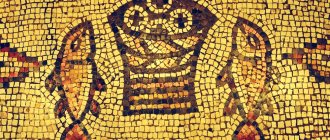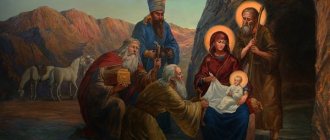WHY DONT JEWS BELIEVE IN JESUS?
Save as PDFPrint version
For more than two thousand years, Jews have not accepted Jesus as Moshiach. Why?
One of the most popular questions addressed to the editors of Aish.com is the following: “Why don’t Jews believe in Jesus?” Let's look at the answer to this question one by one, without in any way belittling other beliefs or neglecting other religions, but, most importantly, let's clarify this question from a Jewish point of view, that is, in the light of the Torah.
Jews do not accept Jesus as Moshiach for the following reasons:
- Jesus did not fulfill the messianic prophecies.
- Jesus did not possess the personal qualities inherent in the Moshiach.
- The biblical reference to Jesus as Moshiach is due to an inaccuracy of translation.
- Jewish faith is based on “national revelation.”
But first, a little preface: Who is Mashiach really?
The word מָשִׁיחַ (Mashiach) in Hebrew means “God’s Anointed One,” that is, a person appointed by G-d to a special service, and as a sign of his chosenness, previously anointed with oil (Shemot 29:7; 1 Melachim 1:39; 2 Melachim 9:3).
Jesus did not fulfill messianic prophecies
What is the essence of the fulfillment of the prophecies of Moshiach? One of the central themes of the prophecies is the promise of a future perfect world where all people will live in harmony with each other and recognize the One God (Isaiah 2:1-4, 32:15-18, 60:15-18; Tzpanya 3 :9; Hoshea 2:20-22; Amos 9:3-15; Micah 4:1-4; Zechariah 8:23b 14:9; Irmeyahu 31:33-34).
The Tanakh tells us what Moshiach must do:
- Build the Third Temple (Echezkel 37:26-28).
- Gather all the Jews who are scattered to the Land of Israel (Isaiah 43:5,6).
- To usher in an era of peace throughout the world, to put an end to hatred, oppression, suffering and disease, as it is written by the prophet: “Nation shall not lift up sword against nation, neither shall they learn war any more” (Isaiah 2:4).
- To spread the teaching about the G-d of Israel that will unite humanity into one union. Thus declares the prophet: “And the Lord will be king over all the earth; on that day the Lord will be one (for all), and His name is one” (Zechariah 14:9).
If a person claiming the title of Moshiach fails to fulfill at least one of the specified conditions, he cannot be a true Moshiach .
But over the past years, no one has yet fulfilled the role of Moshiach described in the Tanakh, which is why Jews are still waiting for him. All those who had already claimed the role of Moshiach, including Jesus of Nazareth, Bar Kochba and Shabtai Zvi, failed and were rejected by the Jews.
Christians claim that Jesus will fulfill all the prophetic signs at the time of his Second Coming. Jewish sources reveal the Moshiach, who will carry out the Divine mission the first time, for in the Tanakh there is no concept of the Second Coming .
Jesus did not have the personal qualities of Moshiach
A. Mashiach as a prophet
Moshiach will be the greatest prophet in human history after Moshe (Targum - Yeshayahu 11:2; Maimonides - Teshuvah 9:2).
The prophecy can only be fulfilled in the Land of Israel, when many Jews gather together in one place; such an event has not occurred since 300 BC. During the time of Ezra, when most of the Jews were in Babylon, the prophecy ended with the death of the last prophets - Hagai, Zechariah and Malachi.
Jesus appears on the historical scene about 350 years after the end of the prophecy, so he could not have been a prophet.
B. Descendant of David
Many Tanakh texts mention a descendant of King David who will reign in the age of perfection (Isaiah 11:1-9; Irmahu 23:5-6, 30:7-10, 33:14-16; Ezekiel 34:11-31, 37 :21-28; Hoshea 3:4-5).
Mashiach must be a paternal descendant of King David (see Bereshit 49:10; Yeshayahu 11:1; Jeremiah 23:5, 33:17; Yechezkel 34:23-24). According to the Christian claim, Jesus was virginally conceived, which means he has no father—thus, he cannot claim absolute fulfillment of prophecy without being a paternal offspring of King David.
According to Jewish sources, Mashiach will be born from human parents and will have qualities inherent in ordinary people. He will be neither a demigod2 nor a person with supernatural powers.
B. Observance of the Torah
Mashiach will lead the people to serve the Creator, according to the instructions of the Torah. The Torah states that all mitzvot are bound forever and no one can change them. Anyone who tries to do this must be declared a false prophet (Deuteronomy 13:1-4).
Taking into account what is written in the Christian "New Testament", Jesus revises the institutions of the Torah and argues that its commandments are outdated and no longer applicable. For example, in John 9:14 it is written that Jesus mixed dirt with saliva, thereby breaking the Sabbath, which caused the Pharisees to be indignant (verse 16): “He does not keep the Sabbath!”
Mistranslated texts that “hint” at Jesus
The Tanakh is only truly understood when the original Hebrew text . In the case of the Christian translation of the Tanakh, a number of inconsistencies with the original source can be found.
A. Immaculate Conception
The Christian concept of the virgin birth originates from the text of the book of the prophet Yeshayahu (7:14), which calls a woman the word “alma”; indeed, the word “alma” always meant “young woman”, but Christian theologians, several centuries later, translated it otherwise known as the word "virgin". This approach to the birth of Jesus dates back to first-century paganism, where mortal beings were impregnated by the gods.
B. The Suffering Servant
Christianity is convinced that the prophecy from Yeshayahu 53 necessarily belongs to the “suffering servant” - Jesus.
In fact, chapter 53 (Yeshayahu 53) follows directly from the central theme of chapter 52, which describes the exile and redemption of the Jewish people. The prophecy uses the singular form because the Jews (“Israel”) are considered as a single whole - the people of Israel. In all Jewish sources, Israel is seen as the only “servant of G-d” (see Yeshaya 43:8). Truly, in the book of the prophet Yeshayahu, up to chapter 53, Israel is mentioned as God’s servant no less than 11 times.
If we read this chapter correctly (Yeshayahu 53), then its content fully reflects the idea that the Jewish people were “oppressed and tormented, and did not open their mouth, like a sheep led to the slaughter” in the hands of the nations of the world. These images are repeated repeatedly throughout the Jewish scriptures to describe with particular force the suffering of the Jewish people. (see Tehilim 44).
In conclusion, Yeshayahu 53 concludes that when the Jewish people are redeemed, the rest of the nations will realize what has happened and accept their responsibility for the unnecessary suffering and death of every Jew.
Jewish faith is based on "national revelation"
Throughout history, the thousands of religions created by man have always been distinguished by the conviction of the immutability of their statements and the confidence in the truth of the revelation from God himself. But personal revelation is a very weak basis for faith, because there is always reason for doubt: did the revelation really happen? For no one heard how G-d spoke to this or that person, and all his statements are based only on his words. And in the case when a person claiming personal revelation can perform miracles, this cannot be evidence that he is a prophet. All miracles - even if they are genuine - are viewed through the prism of certain human capabilities, but not for the purpose of proclaiming and giving him the status of a prophet.
Judaism, alone of all the world's major religions, does not rely on miracles as the foundation of its teachings. In fact, the Torah says that sometimes G‑d gives charlatans the power to “perform miracles” in order to test the Jewish people’s loyalty to their Torah (Devarim 13:4).
Of the many thousands of religions throughout the history of mankind, only Judaism builds the basis of its doctrine on “national revelation,” that is, on the fact that G-d speaks to his people . If G-d lays the foundation of His religion, then this has a special meaning, and He will reveal the Tablets of His teaching to the whole people, and not to one person in a personal conversation.
Maimonides states (Foundations of the Torah, chapter 8): “The Jews did not believe in Moshe, our teacher, because of the miracles he performed. Whenever someone's faith is based on the miracles they have seen, doubts increase among the Jewish people, because, most likely, the miracles could have been performed using magic or witchcraft. But all the miracles that Moses performed in the desert were used for their intended purpose, and not as proof of his prophetic gift.”
What served as the solid foundation of the [Jewish] faith ? The solid foundation of the [Jewish] faith was the Revelation on Mount Sinai, which we saw with our own eyes and heard with our own ears, and this Revelation did not depend on the testimony of other people, for it is written: “Face to face God spoke to you...”. The Torah states: “The Lord did not make this covenant with our fathers, but with us; we are those who are here today and are all alive ” (Deuteronomy 5:4,3).
Judaism is not about the greatness of miracles. This is the personal testimony of every man, woman and child who stood on Mount Sinai 3,300 years ago.
Waiting for Moshiach
The world is in dire need of redemption. We are well aware of the problems of society, and for this reason we will strive for redemption. According to the Talmud, one of the first questions asked of a Jew on the Day of Judgment will be: “Have you longed for the coming of Moshiach?”
How can we hasten the coming of Moshiach? The best way to show love for humanity is to observe the mitzvot of the Torah (in the best possible way) and encourage others to do the same.
Despite the gloom of events taking place on earth today, the world appears to be moving steadily towards the threshold of redemption. One of the obvious signs of the approaching Era of Moshiach is that the Jewish people are returning to the land of Israel and flourishing again. In addition, we are seeing a mass movement of young Jews returning to the roots of their tradition - the Torah.
Mashiach can come any day: everything depends on our actions. God is ready to act, but He is waiting for us, for as King David said, “Redemption will come today if you will heed His voice.”
Notes
- Yosef ultimately accepts Jesus and pursues his genealogy through adoption. But there are two problems around this:
a) There is not even a hint in the Tanakh that a father can pass on his tribe through adoption. A priest who has adopted a son from another tribe through adoption cannot ordain him as a priest.
b) Yosef cannot convey what he does not have by acceptance. Since Yosef ascends from Yehoyachin (Gospel of Matthew 1:11), he is under the curse of this king so that none of his descendants can reign on the throne of David. (Irmeyahu 22:30, 36:30). Although Yehoyachin repented, as discussed in the Talmud (Sanhedrin 37a) and elsewhere, it is not entirely clear whether the continuation of the royal line through his repentance was possible. (See, for example, Bereshit Rabbah 98:7 for the example of King Tzidkiyah.)
To resolve this difficult dilemma, defenders of Christianity argue that Jesus accepts the genealogy of a descendant of King David through his mother, Mary, who is supposedly his direct descendant, as written in Chapter 3 of the Gospel of Luke. There are 4 more main contradictions in this statement:
a) There is no evidence that Mary is a descendant of King David. Luke chapter 3 reveals the genealogy of Joseph, not Mary.
b) Even if Mary comes from the line of King David, Jesus will not be the royal successor, since the anointing for the kingdom comes through the father, and not through the mother (cf. Bemidbar 1:18; Ezra 2:59).
c) If the family lineage had been through the mother's side, Mary would not have been from the legitimate family of Moshiach. According to the Tanach, Mashiach must be a descendant of David through his son Shlomo (2 Shmuel 7:14, 1 Divrei HaYamim 17:11-14, 22:9-10, 28:4-6). The third chapter of Luke is not relevant to this discussion because it describes the genealogy of David's son Nathan, not Solomo (Luke 3:31).
d) In the Gospel of Luke, Shealtiel and Zerubbabel are mentioned in the genealogy. These names are also found in the Gospel of Matthew as the descendants of the cursed Yehoyachin. If Mary descends from them, then this deprives her of the right to be the ancestor of Moshiach.
- Maimonides devotes much of his Guide to the Perplexed to the fundamental idea that G‑d has no physical form. G-d is eternal, outside of time and above it. It is infinite, outside of space. He cannot be born and he cannot die. To claim that G‑d takes human form is to belittle G‑d, to force Him into impossible limits, to narrow His unity and to devalue His Divinity. The Torah sums it up: “God is not mortal” (Bemidbar 23:19).
Read: Why don't Jews accept Christianity?
Report
What personal qualities did Jesus Christ lack to correspond to Moshiach?
- The Jew could not recognize Christ as the Messiah because He was not descended from a descendant of David.
- The Jews believed that everything that was written in the Gospel, in the Old Testament, was an indisputable truth that could not be changed. Anyone who tries to correct the provisions of the Torah is a false prophet.
- From the texts in the Christian New Testament, Jesus revised the provisions of the Torah. He noticed that many of her commandments were outdated. They are not suitable for modern living conditions.
- Shabbat is a ban on work on Sunday. An Orthodox Jew will not even break off his own bread to satisfy his hunger, and will not pour himself water. Jesus broke the Shabbat by mixing saliva with mud and doing work on the holy seventh day. This act greatly outraged the Pharisees.
- The prophecy can only be fulfilled in the Land of Israel, when the Jews gather there. After Moshe, the greatest prophet will be Moshiach.
- During Ezra's time, most of the Jews moved in search of fertile lands and a well-fed life to Babylon. Some of them left with Moses. The rest settled all over the world. Jesus was born 350 years after these events. This means that He cannot be a prophet by Jewish standards.










